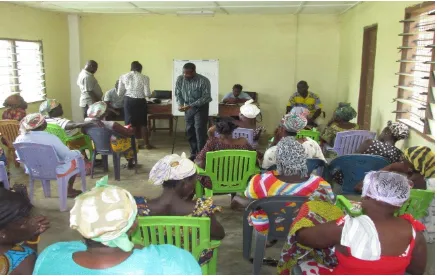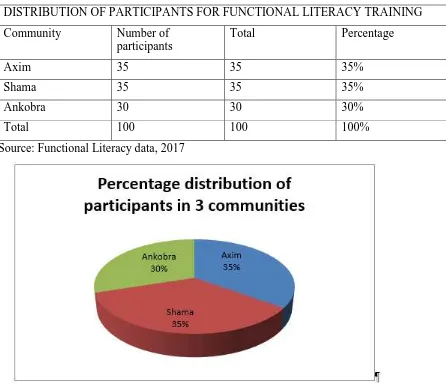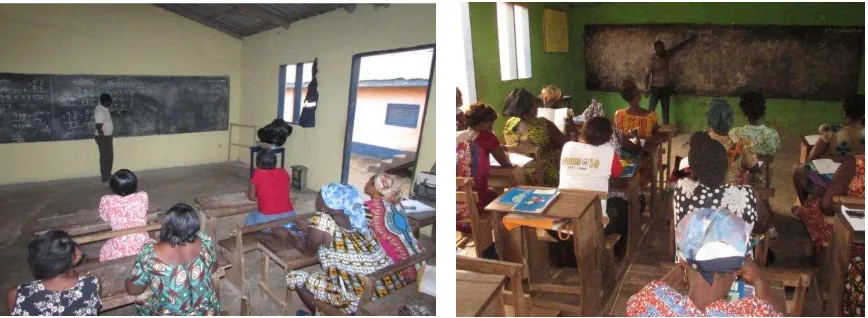SUSTAINABLE FISHERIES
MANAGEMENT PROJECT (SFMP)
Functional Literacy Training Report
This publication is available electronically in the following locations:
The Coastal Resources Center
http://www.crc.uri.edu/projects_page/ghanasfmp/
Ghanalinks.org
https://ghanalinks.org/elibrary search term: SFMP
USAID Development Clearing House
https://dec.usaid.gov/dec/content/search.aspx search term: Ghana SFMP
For more information on the Ghana Sustainable Fisheries Management Project, contact:
USAID/Ghana Sustainable Fisheries Management Project Coastal Resources Center
Graduate School of Oceanography University of Rhode Island
220 South Ferry Rd.
Narragansett, RI 02882 USA
Tel: 401-874-6224 Fax: 401-874-6920 Email: [email protected]
Citation: Kankam, M. (2017). Functional Literacy Training-Reading, Writing, Numeracy, Language Skills For 100 MSMEs. The USAID/Ghana Sustainable Fisheries Management Project (SFMP). Narragansett, RI: Coastal Resources Center, Graduate School of Oceanography, University of Rhode Island
GH2014_ACT111_DQF. 11 pp. Authority/Disclaimer:
Prepared for USAID/Ghana under Cooperative Agreement (AID-641-A-15-00001), awarded on October 22, 2014 to the University of Rhode Island, and entitled the USAID/Ghana Sustainable Fisheries Management Project (SFMP).
This document is made possible by the support of the American People through the United States Agency for International Development (USAID). The views expressed and opinions contained in this report are those of the SFMP team and are not intended as statements of policy of either USAID or the cooperating organizations. As such, the contents of this report are the sole responsibility of the SFMP team and do not necessarily reflect the views of USAID or the United States Government.
Detailed Partner Contact Information:
USAID/Ghana Sustainable Fisheries Management Project (SFMP) 10 Obodai St., Mempeasem, East Legon, Accra, Ghana
Telephone: +233 0302 542497 Fax: +233 0302 542498
Maurice Knight Chief of Party [email protected]
Kofi Agbogah Senior Fisheries Advisor [email protected] Nii Odenkey Abbey Communications Officer [email protected]
Bakari Nyari Monitoring and Evaluation Specialist [email protected] Brian Crawford Project Manager, CRC [email protected]
Justice Odoi USAID Administrative Officer Representative [email protected] Kofi.Agbogah
SNV Netherlands Development Organisation #161, 10 Maseru Road,
E. Legon, Accra, Ghana 233 30 701 2440
Donkris Mevuta Kyei Yamoah
[email protected] Friends of the Nation Parks and Gardens Adiembra-Sekondi, Ghana 233 312 046 180
Peter Owusu Donkor Spatial Solutions
[email protected] #3 Third Nautical Close,
Nungua, Accra, Ghana 233 020 463 4488
Thomas Buck
SSG Advisors 182 Main Street
Burlington, VT 05401 (802) 735-1162
Victoria C. Koomson
[email protected] CEWEFIA
B342 Bronyibima Estate Elmina, Ghana
233 024 427 8377
Lydia Sasu
Darkuman Junction, Kaneshie Odokor Highway
Accra, Ghana 233 302 315894
Gifty Asmah
[email protected] Daasgift Quality Foundation
ACRONYMS
CCM Centre for Coastal Management
CEWEFIA Central and Western Region Fishmongers Improvement Association CRC Coastal Resource Center
CSLP Coastal Sustainable Landscape Project DAA Development Action Association
DFAS Department of Fisheries and Aquatic Science DMFS Department of Marine Fisheries Sciences DQF Daasgift Quality Foundation
FtF Feed the Future
GIFA Ghana Inshore Fishermen's Association GIS Geographic Information System
GNCFC Ghana National Canoe Fishermen’s Council
HM Hen Mpoano
ICFG Integrated Coastal and Fisheries Governance MESTI Ministry of Environment Science and Technology MOFAD Ministry of Fisheries and Aquaculture Development NDPC National Development Planning Commission
NGOs Non-Governmental Organizations
SFMP Sustainable Fisheries Management Project SMEs Small and Medium Enterprises
SNV Netherlands Development Organization
SSG SSG Advisors
STWG Scientific and Technical Working Group UCC University of Cape Coast
URI University of Rhode Island
TABLE OF CONTENTS
CONTENTS
ACRONYMS ... iii
TABLE OF CONTENTS ... iv
LIST OF FIGURES ... iv
LIST OF TABLES ... iv
ACKNOWLEDGEMENTS ... 1
EXECUTIVE SUMMARY ... 1
1 Background ... 1
1.1 Training Objective... 1
1.2 Expected outcome ... 1
2 TRAINING OF TRAINERS... 1
3. ORIENTATION ... 2
4 TRAINING OF PARTICIPANTS ... 3
5 DISTRIBUTION OF PARTICIPANTS AND IMAGES FROM TRAINING ... 3
6 CONCLUSION ... 5
LIST OF FIGURES
Figure 1, Training of Trainers session ... 2Figure 2. Orientation at Shama ... 2
Figure 3 Percentage distribution of participants in 3 communities ... 3
Figure 4. Functional Literacy class at Ankobra ... 4
Figure 5. Functional Literacy class at Shama ... 4
ACKNOWLEDGEMENTS
Sincere gratitude goes to SFMP for providing the guidance and support, and also to the three District Facilitators from NFED in Shama and Ellembelle District, as well as Nzema East Municipality for facilitating the training program.
EXECUTIVE SUMMARY
Functional Literacy Training in reading, writing, numeracy and language was organized for one-hundred MSMEs selected from three coastal communities, namely Shama, Axim and Ankobra to improve upon their literacy skills. Thirty fish processors were selected from Ankobra, and thirty-five each selected from Shama and Axim. In all, there were ninety-nine female participants and one male. Shama held its training on Wednesdays, whereas Axim and Ankobra held theirs on Tuesdays and Fridays, and Thursdays and Fridays respectively.
1 BACKGROUND
Lack of reading, writing and numeracy and language skills among others were evident in the daily lives of fish processors in Axim, Ankobra and Shama during year one and two of the SFMP. It was in this direction that Daasgift Quality Foundation, with support from SFMP engaged the services of Non-Formal Educational Division (NFED) of the Ghana Education Service (GES) to organize Functional Literacy Training in reading, writing, numeracy and language skills for one-hundred fish processors selected from Axim, Ankobra and Shama. 1.1 Training Objective
The objective of the training was to equip one hundred fish processors with writing, numeracy, reading and language skills.
1.2 Expected outcome
It was expected that at the end of the training program, participants would gain knowledge in numeracy, reading and writing in order to function well in the course of business transactions.
2 TRAINING OF TRAINERS
Figure 1, Training of Trainers session
3. ORIENTATION
4 TRAINING OF PARTICIPANTS
Training was done on Wednesdays at Shama, Thursdays and Fridays at Ankobra, and Tuesdays and Fridays at Axim.
At Shama, facilitators used Fanti Primer 1, a model that is used in non-formal education to
teach participants’ pronunciation of the local alphabets, construction of basic sentences,
differences between vowels and consonants; whereas Ankobra and Axim used the English Primer. Participants were also taught how to do calculations and writings using A4 and D7 Exercise Books. Training normally began with a recap of the previous sessions.
In addition, participants were given talks by the National Commission for Civic Education (NCCE) on basic human rights of a citizen.
5 DISTRIBUTION OF PARTICIPANTS AND IMAGES FROM
TRAINING
Table 1. Distribution of participants in 3 communities
DISTRIBUTION OF PARTICIPANTS FOR FUNCTIONAL LITERACY TRAINING
Community Number of
participants
Total Percentage
Axim 35 35 35%
Shama 35 35 35%
Ankobra 30 30 30%
Total 100 100 100%
Source: Functional Literacy data, 2017
Figure 4. Functional Literacy class at Ankobra
6 CONCLUSION
The Functional Literacy Training program was well organized across the three coastal communities, namely Shama, Axim and Ankobra. Facilitators applied the most effective ways of handling adult learners with the use of the appropriate pictorial models.


